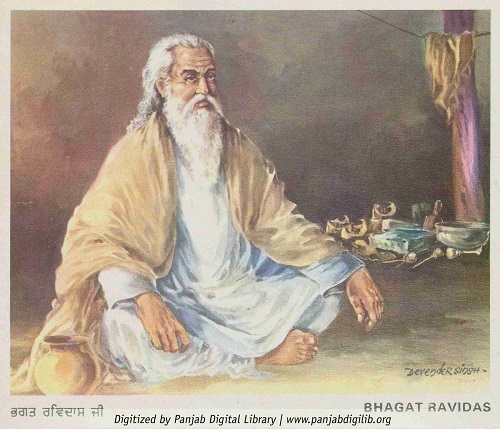Feb 12, 2026
Feb 12, 2026

On the occasion of birth anniversary of Bhagat Ravidas, the true homage to the great soul is through the wisdom of his words in shabad on Page 486 of Sri Guru Granth Sahib (SGGS). Let us start with the words of the Rahaau lines, where the central idea and the essence are shared.

“Maadho abidhiaa hit keen.
Bibek deep maleen. 1. Rahaau.”
Translation: O Lord, he is in love with ignorance. His lamp of clear wisdom has grown dim. 1. Pause.
Here, he says that the man is in love with ignorance. Imagine the quality of life of a person, who is in love with his own ignorance. We can all look at ourselves in the mirror for who this ignorant person is. He then shares the cause of this ignorance by saying that lamp of clear wisdom has grown real dim.
Ignorance is the result of absence of light of divine wisdom within. As a result, life has become a struggle, a challenge, and an uphill task which produces stress. If the connection within had been made, the life would have been transformed into a musical melody blissfully unfolding.
In the first stanza of the composition, Bhagat Ravi Das talks about five creatures, each with just one weak instinct that becomes their own fate finale. The entire animal world lives at the level of instincts alone, which becomes costly; as they lose life because of it. He says imagine the fate of human being who has not just one but all the above five weaknesses. What chances does he have for his redemption? He defines these five maladies as incurable. The human is epitome of creation, besides instincts is also endowed with faculty of logic and rationality, still finds that he is vulnerable.

“Mirag meen bhirang patang kunchar ek dhokh binaas.
Panch dhokh asaadh jaa meh taa kee ketak aas. 1.”
Translation: The deer, the fish, the bumble bee, the moth and the elephant are destroyed, each for a single weakness. So the one who is filled with the five incurable vices - what hope is there for him? ||1||
The details of species and their unique weakness, which becomes cause of their death trap are as under:
Deer:
Sound/ Music, which makes the deer, forget everything and results in it getting trapped by the hunter.
Fish:
Taste buds, the fisherman employs bait on the hook to catch fish.
Bumblebee:
Smell; attracted it to suck nectar pollen. It gets trapped in the lotus flower forgetting to leave when it closes at sunset.
Moth:
Light, its glow attracted the moth, is burned by the flame as it gets too close to it.
Elephant:
Lust, so strong that hunters use a paper decoy female elephant to attract and trap the male elephant.
In the second stanza, he says that animals that creep, swim or walk on four legs don’t have the faculty to think. Even the humans, despite having that faculty still keep their animal like instincts and do not use discrimination to find what is virtuous or what evil tendencies are. The human passions are strong and the discrimination is weak. If he had employed rationality to acquire wisdom then this faculty that he is endowed with could have helped him in addressing the questions of why the world was created and what is the purpose of human life? Unfortunately the education system and society have put the emphasis on producing productive citizens at the cost of deep thinkers. This inner search to those questions would have made the human mind contended. Instead, because of the focus on acquisition and consumption culture, he is always encountering scarcity and lack in life. He could have been affluent and living in abundance by this divine nature. However, the education system and worldly race to become more successful has made man simply covetous, which Ravi Das Ji compares to company of low.

“Tiragadh jon achet sanbhav punn paap asoch.
Maanukhaa avataar dhulabh tihee sangat poch. 2.”
Translation: The creeping creatures live thoughtless lives, and cannot discriminate between good and evil. It is so difficult to obtain this human incarnation, and yet, they keep company with the low. ||2||
In the third stanza, he says that animals living on instincts alone cannot get out of the grip of births and deaths. The ‘karmas’ in present life becomes the cause of rebirth, and then death is termination of that birth.

“Jeea jant jahaa jahaa lag karam ke bas jai.
Kaal faas abadh laage kachh na chalai upai. 3.”
Translation: Wherever the beings and creatures are, they are born according to the karma of their past actions. The noose of death is unforgiving, and it shall catch them; it cannot be warded off. ||3||
In the fourth stanza, he says that while the creatures may be caught in an endless loop of birth-deaths, the humans have option to get out of this cycle.

“Ravidas das udhaas taj bhram tapan tap gur giaan.
Bhagat jan bhai haran paramaana(n)dh karahu nidhaan ||4||1||”
Translation: O servant Ravi Das! Just dispel your sorrow and doubt, and know that Guru-given spiritual wisdom is the penance of penances. O Lord, Destroyer of the fears of Your humble devotees, make me supremely blissful in the end. ||4||1||
This is the prayer of the awakened soul. The life was being dissipated in indulgences. The self-efforts and initiatives cannot remove the soot blocking the light of wisdom. Here the human ignorance has to be replaced with the divine wisdom, as he suggests that we will have to take sanctuary of Almighty and following traits have to be made incorporated:
Acquire Humility
Become detached from worldly desires
Remove your doubt, and
Do the supreme penance of acting on the divine knowledge given by the Guru.
Pray to Almighty for the charity of supreme bliss by taking refuge of God.
Image courtesy: Panjabdigitlib.org
27-Feb-2021
More by : Bhupinder Singh